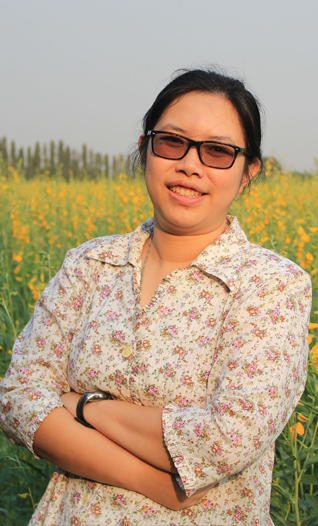Kamolchanok Umnajkitikorn, Ph.D.
School of Crop Production Technology
Institute of Agricultural Technology , Suranaree University of Technology

Kamolchanok Umnajkitikorn, Ph.D.
Contact: +66(0)-4422-3706
k.umnajkitikorn@sut.ac.th
Education
- Ph.D. (Horticulture and Agronomy), University of California Davis, USA
- B.S. (Biology) (First Class Honors), Chiang Mai University, THAILAND
Area of Expertise
Plant physiology and biochemistry, plant biotechnology
Laboratory of Plant Physiology and Molecular Biology
Modern crop production technology is relied on more molecular and physiological information of crop plants than ever before. Therefore, my lab is focusing of the molecular and physiological responses of various crop plants on unfavorable conditions such as water deficit, high temperature and salinity. I use gene expression analysis and biochemical analysis with a plan to extend our specialty to –OMIC analysis to discover or elucidate the mechanisms behind the treatments promoting plant stress tolerance, crop yield and quality improvement.
Current Research
- Drought tolerance in rice by nitrogen and plant growth regulators : Water deficit is a severe problem in crop production worldwide. Based on the fact that more than 70% of nitrogen in leaves is acquired in chloroplasts which are the carbohydrate generator of plant cell so application of nitrogen or hormonal control at the right condition may become the appropriate treatments for improving drought tolerance of crop plants.
- Photoselective-preharvest bagging on grape berry quality : Due to the high temperature and high humidity in Thailand, grape and some other temperate fruits have lower quality in term of sweetness, color and flavor than the ones grown in cooler areas. A number of research showed the potential of adjusted light quality in color and bioactive compounds in various crop species so we are aiming to use photoselective film to improve grape berry quality.
Selected Research output/Publication
- Umnajkitikorn K, Sade N, Rubio Wilhelmi MM, Blumwald, E (2019). Silencing of OsCV (CHLOROPLAST VESICULATION) Maintained Photorespiration and N-assimilation in Rice Plants Grown under Elevated CO2. Plant Cell Environ. Submitted under revision
- Umnajkitikorn K*, Sade N*, Rubio Wilhelmi MM, Wright M, Wang S, Blumwald, E (2017). Delaying chloroplast turnover increases water-deficit stress tolerance through the enhancement of nitrogen assimilation in rice. J. Exp. Bot. doi:10.1093/jxb/erx247.
- Sade N, Rubio Wilhelmi MM, Umnajkitikorn K, Blumwald, E (2017). Stress-induced senescence and plant stress tolerance. J. Exp. Bot. doi:10.1093/jxb/erx235.
- Kamolchanok Umnajkitikorn, Nir Sade, Mar M. Rubio Wilhelmi, and Eduardo Blumwald (2016). Improving plant stress responses to stress-induced senescence by silencing thylakoid turnover in crop plants. Salt & Water Stress in Plants, Gordon Research Conference, Les Diablerets, SWITZERLAND.